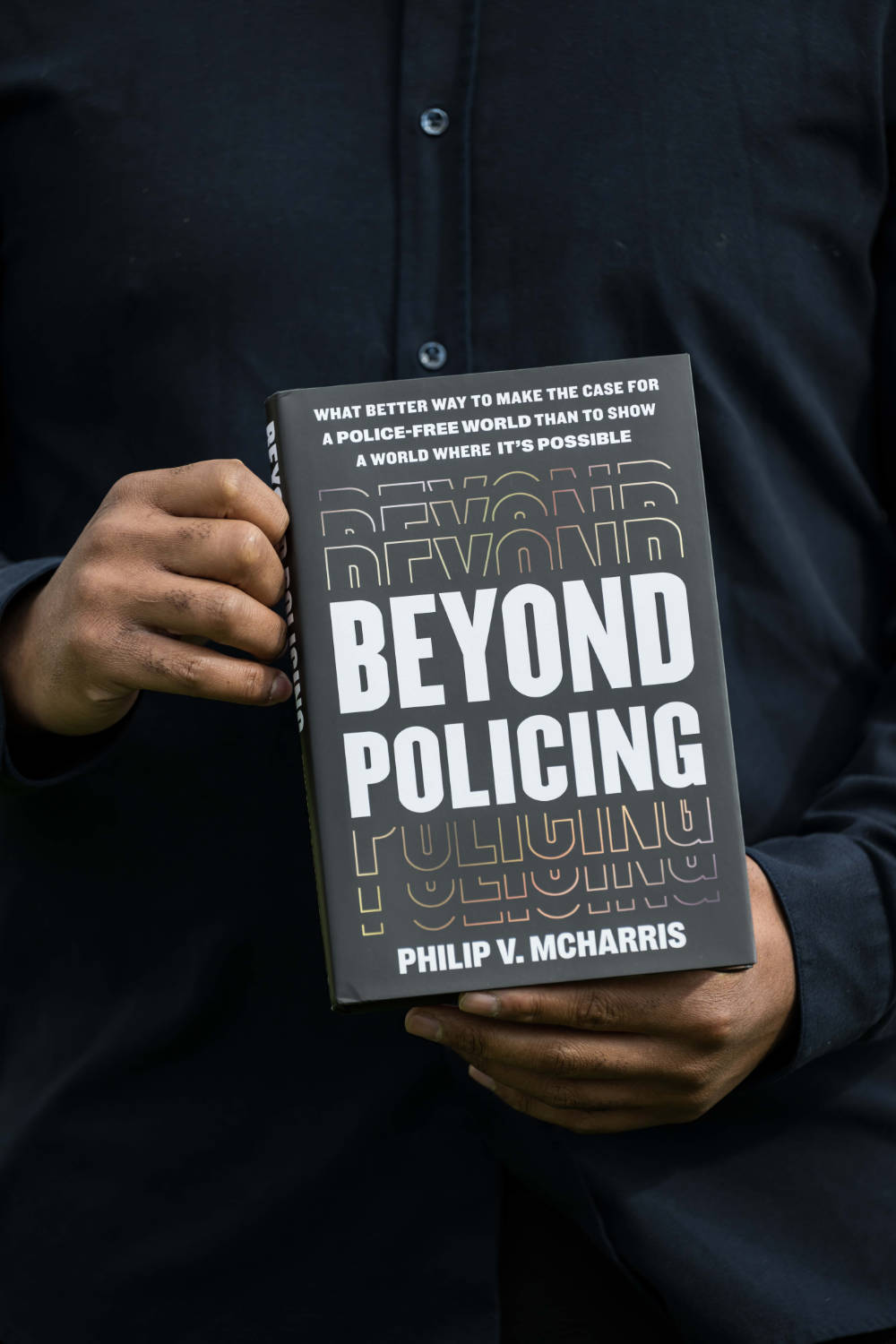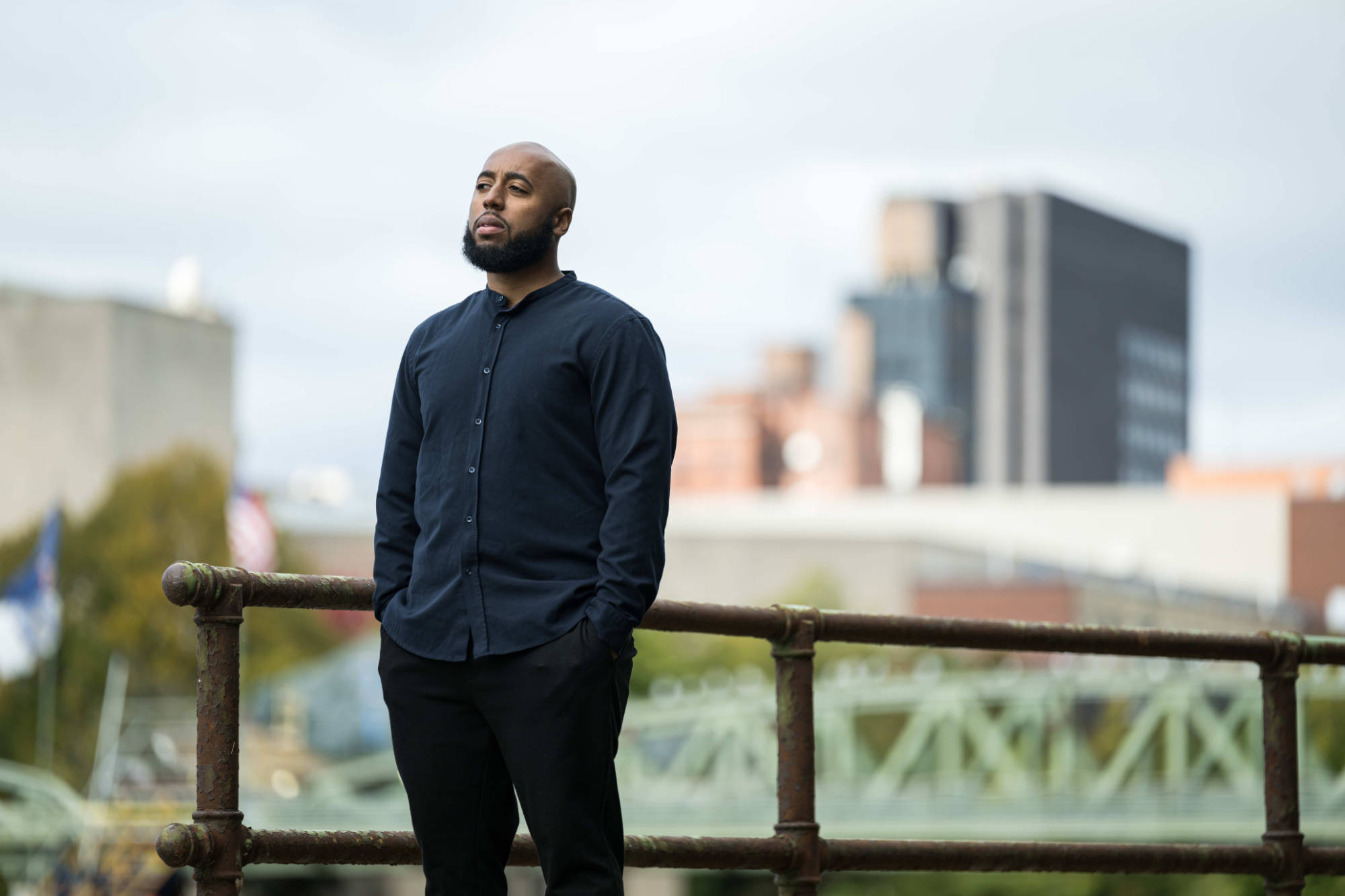A new book by Philip V. McHarris envisions a future where safety is not synonymous with policing, but rather prevention.
Philip V. McHarris presents a reimagined world without police in his latest book, Beyond Policing (Legacy Lit | Hatchette, 2024).
Tackling thorny issues with evidence, data, and personal stories, McHarris's research delves into the weight of policing on people and communities and makes the case that many routine police reforms often only lead to more police.
"What if our response to crisis wasn't about control but about care?" McHarris, an assistant professor of Black studies at the University of Rochester, writes. "How can we create conditions where safety is a shared responsibility? How can we design justice so that no community is routinely oppressed? Envisioning such a world isn't just a daydream; it's the first step toward building a society where violence and fear no longer dictate our lives."
ABC News, which interviewed McHarris about his book, called his examination of the history and impact of policing "not just a surface-level critique, but a comprehensive analysis."
Across the country, efforts to "defund," downsize, or abolish police departments gained traction after national unrest in 2020 prompted by the killing of George Floyd by police in Minneapolis, and later the death of Daniel Prude at the hands of police in Rochester, New York.

In the wake of Prude's death, for instance, the city of Rochester launched the Person in Crisis (PIC) Team, a unit meant to supplement police interactions with people exhibiting signs of mental distress. The team was inspired by a nonprofit mobile crisis intervention program called CAHOOTS (Crisis Assistance Helping Out on the Streets) that has handled mental health calls in Eugene, Oregon, since 1989.
Lawmakers who support such initiatives argue that many social welfare tasks handled by armed police officers-responding to drug overdoses and working with people dealing with mental illness or homelessness, to name a few-would be better carried out by trained social workers or medical professionals.
McHarris's research and commentary related to race, policing, and social justice has been featured in The New York Times, The Washington Post, CNN, and other major media outlets, and has inspired reform efforts.
McHarris joined the Department of Black Studies at the University of Rochester in 2023. His current book project, Brick Dreams, is an ethnography-based manuscript focused on the New York City Housing Authority and contemporary realities and challenges of public housing in America.
Below are his responses to a few questions about Beyond Policing and his related research during an interview.
Q&A with Philip V. McHarris
In a world without police, who would people call to report a crime or seek immediate assistance, like a victim of domestic abuse?
McHarris: A world beyond policing is one where communities have robust infrastructures of care in place, and where the conditions that lead to harm are addressed long before they escalate. In the case of domestic abuse, for instance, specialized services-such as crisis response teams, mental health professionals, and both rapid and long-term housing support-would be readily available and adequately funded. These services would be community-rooted and trauma-informed, unlike current policing models that often exacerbate harm for vulnerable populations.
It's also crucial to note that at least two studies have found that 40 percent of police households experience domestic violence, four times higher than the general public. The power that police officers hold shapes their ability to engage in unchecked violence, both on the streets and within their homes. This points to the reality that police are not best equipped to respond to domestic violence, especially when many people living in police households need interventions themselves.
Beyond this, we need new ways of understanding harm, violence, and conflict-moving beyond limited frames of crime as metrics of concern around safety, which I discuss in Beyond Policing. So, the real question is, who do we call when there is a need for help? Moving beyond police means envisioning a system where prevention and response are prioritized by trained responders and community safety approaches, rather than relying on a system that often perpetuates harm.
Does the world you imagine still have some law enforcement functions?
McHarris: The vision of abolition emphasizes addressing the root causes of violence and harm and developing non-carceral safety systems, rather than relying on reactive, punitive systems. This means building approaches that not only prevent harm from occurring in the first place but also address extreme situations if they arise in very different ways.
However, these approaches must be built from the ground up, centering true community safety-not violence or control. Instead of traditional policing models, this would involve comprehensive, community-driven responses rooted in care, conflict resolution, trained teams, and accountability.
So, in short, no. There are mechanisms of safety and accountability, but they do not mirror the logics or formations of policing today.

Is there a better word than "defunding" to describe the redirection of funds from policing to alternative models?
McHarris: "Defunding" is often misunderstood, but it stems from the divest/invest strategy, which emphasizes redirecting resources away from punitive systems and toward life-affirming ones. "Defund/fund" may be more descriptive, though rallying cries like "defund the police" don't always carry the full framework.
It's important to note that when schools, health care, libraries, parks, or anti-poverty programs are defunded, there isn't an uproar. But when police power-which is at the root of police violence, not merely training or superficial reforms-is challenged, it becomes contentious.
The core issue is that challenging police power is what will ultimately allow us to build a safer world. Addressing violence and harm holistically means working toward a world beyond these systems of harm.
Is a world without police realistic?
McHarris: This question gets to the heart of abolitionist thinking. Abolition is a long-term project to build safer, healthier, and more equitable communities. What is often considered "realistic" is shaped by our current structures, but many things once deemed impossible-like the abolition of slavery-were realized through sustained movement and imagination.
Abolition asks us to reimagine safety beyond punitive responses and to create conditions in which police are no longer necessary because the root causes of harm, conflict, and violence-such as poverty, inequality, and disenfranchisement-are no longer in place.
Many people would have told Frederick Douglass that the abolition of slavery was unrealistic and impossible. But as Douglass himself said, "If there is no struggle, there is no progress." Just as the vision to abolish slavery required imagination, struggle, and an unwavering belief in the possibility of a more just world, so too does the abolition of policing and the carceral state.
Abolition challenges us to envision a future where safety is not rooted in punishment, but in justice and care. A world without police may seem distant now, but, like the struggles of the past, it is through sustained movement and collective action that the impossible becomes reality. As geographer and abolitionist Ruth Wilson Gilmore has said, "In order to undo the forces of violence shaping our everyday lives, we would have to change everything."
Abolition is not simply about removing harmful systems, but about transforming society at its roots to create the conditions for true safety and flourishing.






